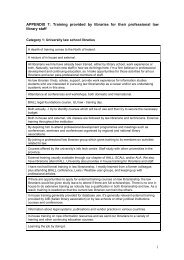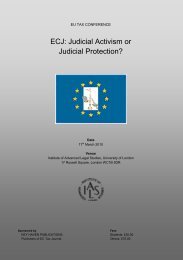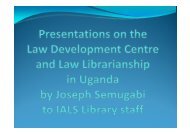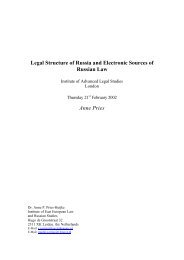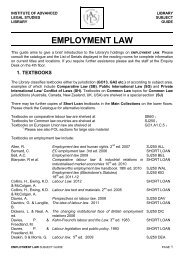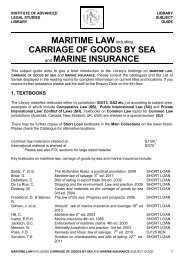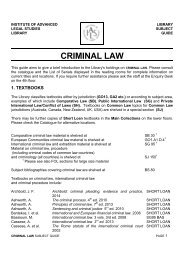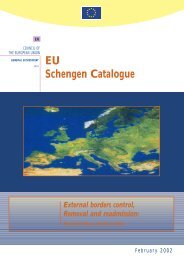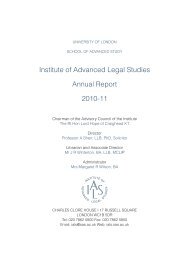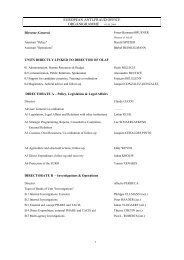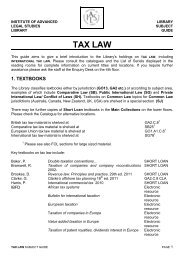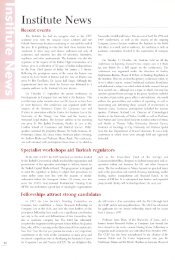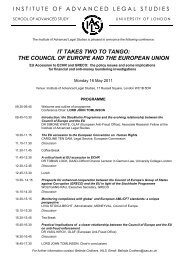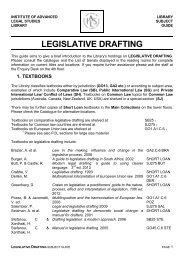a thesis - Institute of Advanced Legal Studies
a thesis - Institute of Advanced Legal Studies
a thesis - Institute of Advanced Legal Studies
You also want an ePaper? Increase the reach of your titles
YUMPU automatically turns print PDFs into web optimized ePapers that Google loves.
ENFORCEABILITY OF EXPRESS TRUSTS. 53<br />
<strong>of</strong> contract law, and since (exceptions excepted) no one can sue on<br />
a contract unless he is a party to the consideration, no one can<br />
enforce the contract to create the trust unless he is a party to the<br />
consideration. However, in the ordinary case <strong>of</strong> a marriage settlement,<br />
the children <strong>of</strong> the contemplated marriage itself are said to<br />
be "within the consideration <strong>of</strong> the marriage," and may enforce<br />
any covenant for their benefit contained in the settlement (Pollock,<br />
Contracts, 7th ed. 210) ; and the trustees may sue on behalf <strong>of</strong><br />
the intended beneficiaries instead <strong>of</strong> the latter suing for themselves.<br />
II.——VOLUNTARY TRUSTS.<br />
Where no valuable consideration has been given for the creation<br />
<strong>of</strong> the trust, whether it will be enforced by the courts or not<br />
depends on whether it has been perfected or not.<br />
The rule is stated by Lord Eldon in Ettison v. Ellison (1802,<br />
6 Ves. 656) as follows :—" I take the distinction to be that if you<br />
want the assistance <strong>of</strong> the court to constitute you cestui que trust,<br />
and the instrument is voluntary, you shall not have that assistance<br />
for the purpose <strong>of</strong> constituting you cestui que trust: as upon a<br />
covenant to transfer stock, &c., if it rests in covenant and is purely<br />
voluntary, this court will not execute that voluntary covenant.<br />
But if the party has completely transferred stock, &c., though it is<br />
voluntary, yet the legal conveyance being effectually made the<br />
equitable interest will be enforced by this court."<br />
(See also Pulvert<strong>of</strong>t v. Pulvert<strong>of</strong>t (1811), 18 Ves. Jun. at p. 99;<br />
Petre v. Espinasse (1834), 2 My. & K. 496; Bill v. Cureton<br />
(1835), ibid. 503 ; Henry v. Armstrong (1881), 18 Ch. D. 668 ;<br />
Paul v. Paul (1882), 20 Ch. D. 742 ; Harding v. Harding (1886),<br />
17 Q. B. D. 442.)<br />
" The question, I conceive, must be simply this, whether the<br />
relation <strong>of</strong> trustee and cestui que trust has actually been established<br />
or not," said Wigram, V.-C., in Meek v. Kettlewett (1842, 1 Hare,<br />
at p. 470).<br />
(a) Perfect Voluntary Trusts.—The manner in which the<br />
relationship may be constituted, or in other words a perfect trust<br />
created, is pointed out by Turner, L. J., in Milroy v. Lord (1862,<br />
4 De Gr. F. & J. at p. 274), where he says: "I take the law <strong>of</strong><br />
this court to be well settled that, in order to render a voluntary<br />
settlement valid and effectual, the settlor must have done every-



